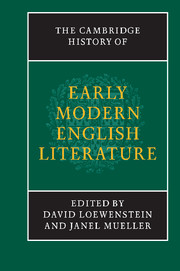Book contents
- Frontmatter
- Introduction
- 1 Modes and means of literary production, circulation and reception
- 2 The Tudor era from the Reformation to Elizabeth I
- 3 The era of Elizabeth and James VI
- 4 The earlier Stuart era
- 15 Literature and national identity
- 16 Literature and the court
- 17 Literature and the church
- 18 Literature and London
- 19 Literature and the theatre to 1660
- 20 Literature and the household
- 5 The Civil War and Commonwealth era
- Chronological outline of historical events and texts in Britain, 1528–1674, with list of selected manuscripts
- Select bibliography (primary and secondary sources)
- Index
- References
19 - Literature and the theatre to 1660
from 4 - The earlier Stuart era
Published online by Cambridge University Press: 28 March 2008
- Frontmatter
- Introduction
- 1 Modes and means of literary production, circulation and reception
- 2 The Tudor era from the Reformation to Elizabeth I
- 3 The era of Elizabeth and James VI
- 4 The earlier Stuart era
- 15 Literature and national identity
- 16 Literature and the court
- 17 Literature and the church
- 18 Literature and London
- 19 Literature and the theatre to 1660
- 20 Literature and the household
- 5 The Civil War and Commonwealth era
- Chronological outline of historical events and texts in Britain, 1528–1674, with list of selected manuscripts
- Select bibliography (primary and secondary sources)
- Index
- References
Summary
The story of early Stuart theatre is a narrative almost entirely confined to England and Wales. The austere Calvinism of Stuart Scotland did not encourage the development of secular theatre, and the kirk bitterly resented the English travelling companies that occasionally visited Edinburgh while James still resided there. Once the court went south in 1603, leaving the kingdom without a king, Scotland’s fragile drama withered away to nothing. The only significant plays written by a Scot during the entire period were Sir William Alexander’s Monarchic Tragedies (1607) – four closet dramas in intricately Senecan style that were not intended for performance, by a courtier who followed James to London and became completely anglicised. Ireland had a more developed native drama – at Kilkenny, ecclesiastical pageants survived into the 1630s – and English companies occasionally visited Dublin, but the only sustained attempt to establish a professional theatre was the Werburgh Street playhouse, opened by John Ogilby in 1637. These were the years when Lord Deputy Wentworth was living at Dublin in ostentatiously vice-regal style, and Ogilby, his children’s tutor, received a new office of Irish Master of the Revels. But since Werburgh Street performed an essentially English repertoire, with actors and a playwright (James Shirley) recruited from London, it inevitably exhibited the tensions of cultural colonialism. Shirley’s prologues express an outsider’s discomfort with the Dublin audience, and although he wrote one play on Irish history, St Patrick for Ireland (c. 1639), it represented the locals as sullen, barbaric and needing acculturation.
- Type
- Chapter
- Information
- The Cambridge History of Early Modern English Literature , pp. 565 - 602Publisher: Cambridge University PressPrint publication year: 2003
References
- 1
- Cited by



